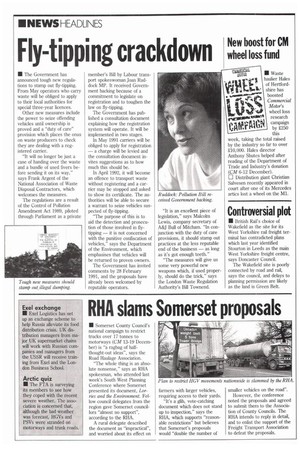Fly-tipping crackdown
Page 8

If you've noticed an error in this article please click here to report it so we can fix it.
• The Government has announced tough new regulations to stamp out fly-tipping. From May operators who carry waste will be obliged to apply to their local authorities for special three-year licences.
Other new measures include the power to seize offending vehicles until ownership is proved and a "duty of care" provision which places the onus on waste producers to check they are dealing with a registered carrier.
"It will no longer be just a case of handing over the waste and a bundle of used fivers before sending it on its way," says Frank Argent of the National Association of Waste Disposal Contractors, which welcomes the measures.
The regulations are a result of the Control of Pollution Amendment Act 1989, piloted through Parliament as a private member's Bill by Labour transport spokeswoman Joan Ruddock MP. It received Government backing because of a commitment to legislate on registration and to toughen the law on fly-tipping.
The Government has published a consultation document explaining how the registration system will operate. It will be implemented in two stages.
In May 1991 carriers will be obliged to apply for registration — a charge will be levied and the consultation document invites suggestions as to how much this should be.
In April 1992, it will become an offence to transport waste without registering and a carrier may be stopped and asked to show its certificate. The authorities will be able to secure a warrant to seize vehicles suspected of fly-tipping.
"The purpose of this is to aid the detection and prosecution of those involved in flytipping — it is not concerned with the punitive confiscation of vehicles," says the Department of the Environment, which emphasises that vehicles MU be returned to proven owners.
The Government has invited comments by 28 February 1991, and the proposals have already been welcomed by reputable operators. "It is an excellent piece of legislation," says Malcolm Lewis, company secretary of A&J Bull of Mitcham. "In conjunction with the duty of care provisions, it should stamp out practices at the less reputable end of the business — as long as it's got enough teeth."
"The measures will give us some very powerful new weapons which, if used properly, should do the trick," says the London Waste Regulation Authority's Bill Townend.
























































